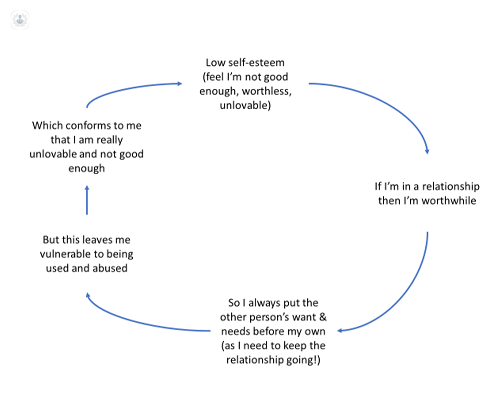How improving your self-esteem can lead to healthier relationships
Written by:Healthy relationships begin with healthy self-esteem. It’s easier said than done, however. So, how can we improve this essential part of the human psyche?
Leading consultant clinical psychologist Dr Kerry Ashton-Shaw can help. She speaks to Top Doctors all about self-esteem in expert detail, considering the cycle that maintains low self-esteem and provides a helpful quiz we can take to get an indication of our levels of self-esteem.

How is self-esteem linked to relationships?
We all know the old adage, right? You’ve got to love yourself before loving someone else…
But what does is really mean? Loving or liking yourself is linked to your self-esteem; having belief and confidence in your own worth your own ‘goodness’.
We aren’t always fully conscious of our self-esteem - we see the world and our relationships through a certain lens depending on our level of self-esteem. So, if we feel good about ourselves, believe we are worthwhile, we live our lives through this lens, which is great! We are less likely to end up in a harmful or unhealthy relationships.
But what happens when we see ourselves through a different lens. When we believe we are worthless, unlovable, and just ‘bad’?
How can low self-esteem lead to negative relationships?
In relationships that can leave us vulnerable to being used and abused; more likely to stay in unequal and unhealthy relationships. If we truly believe ourselves to be ‘bad’ in some way then we tend to develop ways to protect ourselves. So, we might develop the belief that “If I am in a relationship then I am good enough”. These beliefs aren’t always fully conscious - we just get into unhelpful patterns of thinking and behaving because of them.
Can you see the problem here? If the relationship ends then our self-esteem is threatened, the belief that we are unlovable and worthless comes to the surface and this can be emotionally distressing and overwhelming. So, we can tend to stay and put up with an unhealthy relationship instead of leaving. Because to leave would mean exposure to difficult thoughts and feelings.
It’s like an unhelpful cycle that maintains low self-esteem…

What can we do to improve low self-esteem?
So, what can we do about it? Beliefs underlying our self-esteem like “I am worthwhile” “I am important” or “I am worthless” “I’m not good enough” develop based on our life experiences, especially our early life experiences when our brains are developing at an exponential rate. Now although we can’t go back and change the things that have happened in our lives, we can change our narratives and understanding around this. This is usually something you would do with the help of a clinical psychologist or with some self-help materials:
https://www.cci.health.wa.gov.au/Resources/Looking-After-Yourself/Self-Esteem
If you would like to get a measure of your own self-esteem you can take this quiz:
Instructions: Below is a list of statements dealing with your general feelings about yourself. If you strongly agree, circle SA. If you agree with the statement, circle A. If you disagree, circle D. If you strongly disagree, circle SD.
On the whole, I am satisfied with myself.
SA A D SD
* At times, I think I am no good at all.
SA A D SD
I feel that I have a number of good qualities.
SA A D SD
I am able to do things as well as most other people.
SA A D SD
I feel I do not have much to be proud of.
SA A D SD
* I certainly feel useless at times.
SA A D SD
I feel that I’m a person of worth, at least on an equal plane with others.
SA A D SD
* I wish I could have more respect for myself.
SA A D SD
* All in all, I am inclined to feel that I am a failure.
SA A D SD
I take a positive attitude toward myself.
SA A D SD
Scoring: SA=3, A=2, D=1, SD=0. Items with an asterisk are reverse scored, that is, SA=0, A=1, D=2, SD=3. Sum the scores for the 10 items. The higher the score, the higher the self-esteem.
Typical scores around 22, with most people scoring between 15 and 25.
What are the important things to remember about the improvement process?
Healthy relationships can be essential in starting to develop a more positive view of yourself and some healthy self-esteem. But the first relationship to work on is your relationship with yourself. Try and show yourself some compassion and kindness, take a moment to think about the things you are good at, the achievements you have made so far in your life.
If you are in a romantic relationship, does the other person help you see your worth and your own ‘goodness’? Or does the relationship leave you criticising yourself? Which relationship would you rather be in - and how can you start to move in the right direction for yourself? Because you are worthwhile, you are important and you are lovable.
Are you looking to break the low self-esteem cycle for good? Arrange a consultation with Dr Shaw via her Top Doctors profile.



